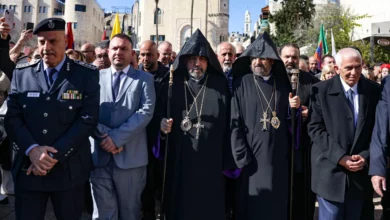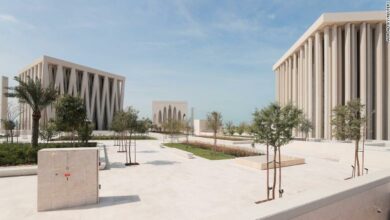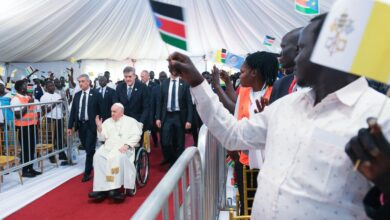Egypt’s oldest syndicate is not a professional syndicate, but rather one of extended family members. The Syndicate of Al-Ashraf, decedents of the Prophet Mohamed and his immediate family, was officially recognized by decree of Khedive Abbas Helmi in 1895, but originated over 1,040 years ago. It was founded during the rule of Egypt’s Fatimid Dynasty in the Hijri year 358 (968 AD) and its first president (Arabic: naqib) was the Caliph al-Mu’izz li-Deinillah. Egypt was the first country in which such a syndicate was established.
At the headquarters of the Syndicate of Al-Ashraf, the current President Mahmoud el-Sharif, told Al-Masry Al-Youm “we intend on producing a historical movie about Al-Ashraf in Egypt from the days of Sayyeda Zeinab (the Prophet’s granddaughter) to our present day.” He added that this movie is still in its planning stages, but would most likely be directed by Hani Lasheen, director of a documentary movie about Jesus and the Holy Family’s flight into Egypt.
El-Sharif estimates that in Egypt there are five million descendants of Al al-Bayt (“The Family Members”) – the Prophet Mohamed’s daughter Fatima, his cousin/son-in-law Ali, and his grandsons Hassan and Hussein. Countrywide, the prestigious Syndicate of Al-Ashraf has well over 80,000 registered members. Beyond the general syndicate’s headquarters in Cairo there are 40 branch syndicates and local councils across the country.
“We have councils of Al-Ashraf in nearly every governorate, city, town, village and hamlet” said el-Sharif. “The only exception is Wadi el-Gadid where there is no council, yet there are Ashraf and families descendant from Al al-Bayt even in this remote governorate.”
The robed and turbaned President of the Qesna Branch Council for Al-Ashraf in the Luxor Governorate, Abdel Ghani Abdel Naeem, told Al-Masry Al-Youm “we partake in religious celebrations, offer social solidarity programs, we provide charity works, and we collect zakat (Arabic for alms-giving) for distribution amongst the poor.” He added “every sharif is an integral part of the society he lives in. He must not consider himself superior to others by virtue of his descent, but must rather assist his society – especially its needy elements.” Abdel Naeem is also a leading figure in the Sufi Shaybaniya Sect, and the Director of the Qesna Youth Center.
According to el-Sharif, the syndicate’s activities include Islamic missionary work “by spreading the word of God and the message of his Prophet – may peace be upon him, his family, and companions;” societal outreach programs including “charity work for the provision of aid to needy sectors of society, disaster-relief efforts, and the provision of religious education to counter fundamentalist interpretations of Islam;” along with special services for Al-Ashraf. The syndicate issues the periodical Al-Ashraf Magazine, provides its members with special offers for pilgrimages to Mecca and Madina, and also offers local health care services.
El-Sharif added “we have no health care insurance policies at the syndicate, instead we have compiled a list of all the syndicate members involved in medical professions. Through this list we are able to direct syndicate members to the nearest hospitals, clinics and pharmacies which are owned or managed by other members in their respective governorates.” The president explained that members need only to present their syndicate cards in order to benefit from these low-cost health care services, while free medical care is granted to those members who are unable to afford such services.
The syndicate’s annual membership fees amount to LE15, “but those unable to pay these membership fees do not have to do so, we do not revoke their memberships if they are unable to pay” said el-Sharif. While the Syndicate of Al-Ashraf is not state-funded, it is does receive funding from members who are statesmen and big businessmen.
The General Syndicate’s High Council consist of 33 members including Ahmed Ezz the billionaire “Steel King” and bigwig in the ruling National Democratic Party, and the Governor of Central Bank Farouq el-Oqda, along with MPs, former ministers, judges, and prominent professionals. Seven of the Supreme Council members have passed away since being appointed or re-appointed to the council in 2008.
The General Syndicate of Al-Ashraf, its president, along with its branch syndicates and councils are not elected, but rather appointed. El-Sharif explained “we chose our council members through a system of shura (Arabic for consultation) where names of candidates from across the country are collectively discussed and studied.” He added that these names are raised before the Supreme Council for the Syndicate of Al-Ashraf, an official state entity. The 22 members of the Supreme Council analyze the candidacies of proposed council members and typically authorize them, unless reservations are expressed. Finally a presidential decree is issued authorizing these candidates.
Sitting in his office, whose wall decorated with a framed Arabic calligraphy reading: "God, Prophet, Mohamed" on top of a golden framed picture of President Honsi Mubarak, the 54 year-old el-Sharif, who is also a member of the ruling National Democratic Party, explained “President Mubarak has not objected to any names authorized by the Supreme Council.” The syndicate’s president, council members and branch councils, were last appointed in 2008. El-Sharif’s candidacy was announced shortly after the death of former syndicate president Ahmed Kamel Yassin in November 2008.
Ahmed Yassin had presided over the General Syndicate since 1994, replacing his late brother Mahmoud – president from 1991. The syndicate was frozen in 1953, with the death of its President Mohamed el-Beblawy, until 1991. At that time the Revolutionary Command Council had decreed the dissolution of the syndicate as it was not a professional-based syndicate but rather one based on hereditary descent. The RCC objected to the title of “Al-Sharif” on the basis that it bestowed a distinguishing or privileged status upon certain citizens, and thus contradicted the principles of their transitional Egyptian Constitution. Egypt’s military rulers also objected to the listing of King Farouq’s name on this syndicate’s membership rosters.
The Syndicate of Al-Ashraf was reactivated 38 years later by decree of President Mubarak. Controversies have lingered around the syndicate and its mechanisms for determining who is, and who isn’t a member of Al-Ashraf. “The syndicate has a specialized Genealogy Committee to determine the hereditary descent of applicants based on their submission of detailed family trees, familial birth certificates, their ancestors’ national IDs, and other documents,” said el-Sharif. However, some syndicate members argue that this system is prone to errors and falsifications.
Libyan President Muamar Qaddafi, has controversially claimed descent from the Prophet, and is reported to have received certification from Egypt’s Syndicate of Al-Ashraf to this extent in 2000. However, the syndicate denies having issued such certification, and the syndicate president had not approved or signed this certification.
In 2002 members of the Genealogy Committee filed a lawsuit before the Cairo Court of Summary Proceedings against the then-President Ahmed Yassin arguing that he, and his brother Mahmoud – his predecessor, had falsified documents pertaining to their ancestry. Charges of misappropriation of syndicate funds were also raised. These charges did not result in a court ruling against either president, however.




